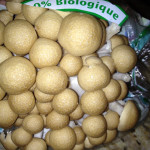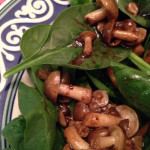

We still like our Mushrooms indeed!
Take a look at the ones on the left. Uncooked. And the bag says you must cook them…. so I did.
Now, the picture on the right? Same mushrooms (cooked) on a bed of spinach. Does that look delectable or what? Bought ’em at Jimbo’s.
And it’s so easy … if you only will remember that mushrooms are like a sponge. They absorb flavors and they plump up with liquids. So, if you are interested in flavorless, dirt like tasting mushrooms, simply use the kitchen sink and that awful contaminated water (in most peoples’ cases), and steam ’em up! lol (bad idea).
But if you’re like me? You take a damp paper towel and you ‘polish’ your mushrooms, just taking off whatever dirt you find. And…..? You want flavor. Garlic, onion, maybe shallots and…. and the missing ingredient?
WHAT IS IT CHEF MARIAN?
Balsamic Vinegar. Balsamic Vinegar cooked down is so sweet. Gives mushrooms particularly, great flavor!
What do we know about mushrooms? I’ve heard some say they are valueless.
But they couldn’t be further from the truth. They are high in nutrients plus Vitamin D and Potassium. But like with everything you eat, you have to know the whole story.
Hey… Dr. Andrew Weil, one of my all time ‘favorties’ says you’ve got to watch out for the toxins in button mushrooms including crimini and portobellos….
WELL THAT’S DISAPPOINTING CHEF!
Ikr? He recommends that you cook them thoroughly. Want to hear exactly what he says?
YES CHEF MARIAN!
Ok. Here’s the quote: “Mushrooms are big favorites of mine, but if you’re just starting to learn about their medicinal properties, I don’t blame you for being confused about which ones are, or aren’t, good for you. In general, I advise against eating a lot of the cultivated white or “button” mushrooms found on supermarket shelves throughout the United States (portobello and crimini mushrooms are the same species). They are among a number of foods (including celery, peanuts, peanut products, and salted, pickled, or smoked foods) that contain natural carcinogens. Just how dangerous these natural toxins are is unknown, but we do know that they are not present in other kinds of mushrooms that offer great health benefits. If you do eat these varieties, never eat them raw and cook them thoroughly over high heat; that will break down some of the toxins”.
So Dr. Weil recommends you go exotic! Here’s the ones he likes best:
- Shiitake: These meaty and flavorful mushrooms contain a substance called eritadenine, which encourages body tissues to absorb cholesterol and lower the amount circulating in the blood. Shiitakes also have antiviral and anticancer effects. Dried shiitakes, available at Asian grocery stores, are also effective. Fresh ones are readily available thanks to domestic cultivation. (To prepare, remove stems or slice fresh ones thinly; they are often tough.)
- Cordyceps: A Chinese mushroom used as a tonic and restorative. It is also known for improving athletic performance. You can buy whole, dried cordyceps in health food stores and add them to soups and stews, or drink tea made from powdered cordyceps. You can also get cordyceps in liquid or capsule form. To treat general weakness, take cordyceps once or twice a day, following the dosage advice on the product. For health maintenance, take it once or twice a week.
- Enoki: Slender white mushrooms that need only brief cooking and have a very mild taste. They are good in soups and salads. Enoki mushrooms have significant anticancer and immune-enhancing effects.
- Maitake: This delicious Japanese mushroom is also called “hen of the woods” because it grows in big clusters that resemble the fluffed tail feathers of a nesting hen. You should be able to find it dried or fresh in Japanese markets, gourmet foods stores, or upscale supermarkets. Maitake has anticancer, antiviral, and immune-system enhancing effects and may also help control both high blood pressure and blood sugar levels.
- Reishi: Strictly a medicinal mushroom, not a culinary one, reishi is woody, hard, and bitter. Like maitake and other related mushrooms species, reishi can improve immune function and inhibit the growth of some malignant tumors. It also shows significant anti-inflammatory effects, reduces allergic responsiveness, and protects the liver. You can buy dried, ground mushrooms and use them to make tea if you don’t mind the bitterness. Otherwise, buy reishi tablets, liquid extracts or capsules, which are available in health food stores and follow the recommended dosage. Take reishi every day for at least two months to see what it can do for you.
I love that he doesn’t just give you his opinion but he gives you a great website (below) to check the facts for yourself!
Allergies to mushrooms are rare, but some people do find them hard to digest. To learn more about the health-promoting effects of mushrooms, check out www.fungi.com, the web site of Fungi Perfecti, an excellent source for information about medicinal and gourmet edible mushrooms, as well as dried mushrooms and extracts.
So that’s the inside dirt on mushrooms. So good. So good for you.
Happy Eating,
Chef Marian